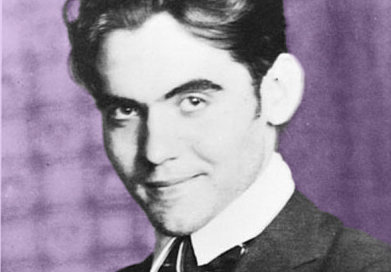
In this letter Frederico García Lorca addresses Jorge Guillén, fellow poet and member of the Generation of ’27. “Solitude,” excerpted below, took a long time to reach the public’s eye. It would come to fruition only when García Lorca visited New York in 1929 and, under the influence of the expat’s malaise, revised the poem with sharper insight as to what it means to spend time alone.
[February 14, 1927]
My dear Jorge,
Today I’m tearing up a long letter of complaints that I wrote you. I receive your letters with the greatest joy. A letter from the poet of the best verses. I will do what you want. Tomorrow I’ll send you poems and write to Dalí asking for a drawing.
By now the presses are groaning with my book of Songs. A book of surprises for many and of joy for a few. To Teresita I dedicate the song of the lizard and his wife because she will laugh a lot to see them cry (poor dears!).
I know that you’ll keep this book in your house and cherish it. That is why I’m publishing it. My friends will receive it in a way that really moves me. Here in Granada all the fellows are preparing a party for the day the book arrives, and there will be music and dancing. Few books are received like this. But at heart I believe they are not receiving my poetry…they are receiving me.
I’ve gone through veritable anguish arranging the songs, but they are done! I’m sure of that. The book, good or bad, is of completely noble blood.
What a lovely ballad you’ve published. You sent it to me before. It has, like everything of yours, the grace and modesty of a nude statue.
There is in all your poetry an emotion, a GRIEF (yes, grief!) like the processional virgin’s that overcomes its almost astronomical perfection.
Right now I’m writing a “Solitude” that, as you know, I began a long time ago. It’s what I’m sending to the homage to Góngora…if it turns out well. Look at a few verses. Tell me what you think.
ANXIOUS SOLITUDE
NIGHT
Night of closed flower and hidden vein.
—Unripe almond green to the touch—
Night cut down too soon
stirred leaves and souls.
A mute fish in the water’s clamorous expanse
lewdly bathed in the trembling,
luminous ivory, recently cut
from the adolescent horn of the moon.
And if the centaur on its banks
sings a delicious song of chase and arrows,
light green waves cull its accents,
the spikenards of never ending sorrow.
Lyra danced in the feigned curve,
immobile target of frozen geometry.
Wolf eyes sleep in the shadow
relinquishing the blood of the lamb.
On the opposite side, Philomel sings,
humid songs of ivory and hyacinth,
airborne plaint of the mad South,
over the fixed flute of the fountain.
While in the middle of the dark horror
feigning song and awaiting fear
a shipwrecked sailor’s disquieting voice rang out…
This is a fragment. I still have to do a lot of work. Or maybe I’ll throw it into the wastebasket. It’s so difficult to get it right.
If you’d like, I could send you something closer to my own style. Don’t get the wrong idea! I mean in the sense of something more flexible…
Tell me what you think of these verses. And tell me soon. I’m working a lot and I believe I might not be able to finish this Solitude. On the other hand, it seems an irreverence to force myself to do this homage. I’m not sure.
Tomorrow I’ll send you verses, but answer me. And I’ll also be sending you money (how embarrassing!).
Good-bye. Affectionate regards to our beloved Guerrero.
Kisses to the children. Regards (my best and highest) to Germaine, and for you a very strong embrace from
Federico
Dalí’s address is: Monturiol 24, Figueras, Prov. de Gerona
From Federico García Lorca: Selected Letters. Edited by David Gershator. New York: New Directions, 1983. pp. 104–106.
Notes on the Generation of ‘27.
Guillén’s poem “Some Friends,” with reference to García Lorca.
García Lorca takes his title from an epic of the same name by Luis de Gongora, a poet rediscovered by the Generation of ‘27.


